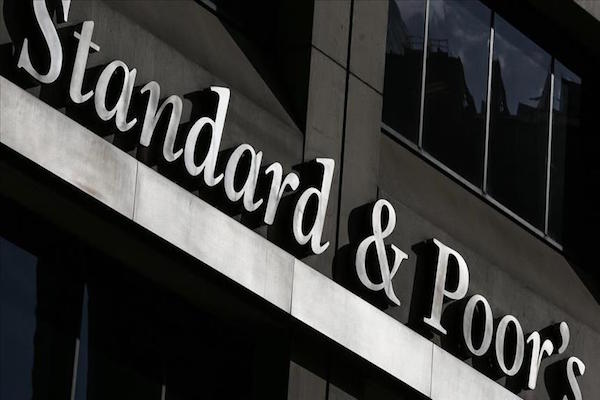ANKARA (AVRUPA TIMES)-Recent European economic data show that the negative interest rate policy has had a positive impact by decreasing the value of the euro and enhancing bank credits, according to a new Standard and Poor's report.
"Data in Europe is showing enough signs to suggest that negative interest rates are having the desired stimulative effect on economic activity," through the euro's falling value and expanding banking credits, according to the S&P report.
The rating agency called negative interest rates the latest "unconventional" item in the toolbox of central banks and other policy-makers globally to tackle the economic issues.
S&P stressed the importance of duration for implementing such an atypical policy in light of the health of the financial system.
"A policy of negative interest rates that remains in place too long could damage bank profitability, weakening one of the key credit transmission mechanisms that could help boost financial activity," warned S&P.
The credit agency also argued that "political (in)stability" is playing an important role in the preference of monetary policies over fiscal policies.
"This is occurring even though fiscal policy may be a more effective tool and doesn’t carry with it the unintended consequence of incentivizing asset managers, insurance companies, pension funds and other market participants to increase their investment risk profiles," claimed the report.
S&P remarked that the fallout of the Brexit in the pound’s depreciation and expansionary monetary actions by the Bank of England might be an obstacle in the European Central Bank's (ECB) path.
"While the ECB’s goal in its negative interest rate policy is focused primarily on the dollar, having another currency slide relative to the dollar may complicate the ECB’s goals," said S&P.
Similar concerns were voiced by the International Monetary Fund and international credit agency Moody's last month.
The IMF announced the growth forecast for the eurozone was 1.6 percent for this year and it lowered the 2017 growth projection to 1.4 percent from 1.6 percent due to the post-Brexit vote's "potential impact of increased uncertainty on consumer and business confidence."
Moody's also cut growth expectations for the eurozone slightly, from 1.7 percent to 1.5 percent for 2016, and from 1.6 percent to 1.3 percent for 2017.



 The candidates vying to be the next London mayor
The candidates vying to be the next London mayor Enfield Council commits to anti-racism and diversity pledge
Enfield Council commits to anti-racism and diversity pledge President Erdogan promised supporters his party would learn its lessons from the defeat
President Erdogan promised supporters his party would learn its lessons from the defeat Mayor of London and London Assembly elections
Mayor of London and London Assembly elections Future Painters Exhibition at Tottenham Hotspur Stadium
Future Painters Exhibition at Tottenham Hotspur Stadium Models of Teaching International Journalism for Sustainable Development
Models of Teaching International Journalism for Sustainable Development UK and US scientists have been working on eclipse observations
UK and US scientists have been working on eclipse observations Unsupportive goverment policies jeopardizing foundation of UK food security
Unsupportive goverment policies jeopardizing foundation of UK food security English Premier League leaders Arsenal will visit title contenders
English Premier League leaders Arsenal will visit title contenders Liverpool meet Atalanta and West Ham face Bayer Leverkusen
Liverpool meet Atalanta and West Ham face Bayer Leverkusen Arsenal face Bayern Munich and Manchester City play Real Madrid
Arsenal face Bayern Munich and Manchester City play Real Madrid UK Transfer deadline day, the transfer window closes tonight
UK Transfer deadline day, the transfer window closes tonight Europe's travel strikes: Flight and train disruption you can expect in April
Europe's travel strikes: Flight and train disruption you can expect in April Enfield Council website achieves digital inclusion recognition
Enfield Council website achieves digital inclusion recognition Enfield Council’s Planning Enforcement team goes from strength to strength
Enfield Council’s Planning Enforcement team goes from strength to strength UK's first Turkish Shacklewell Lane Mosque faces threat to its future
UK's first Turkish Shacklewell Lane Mosque faces threat to its future













